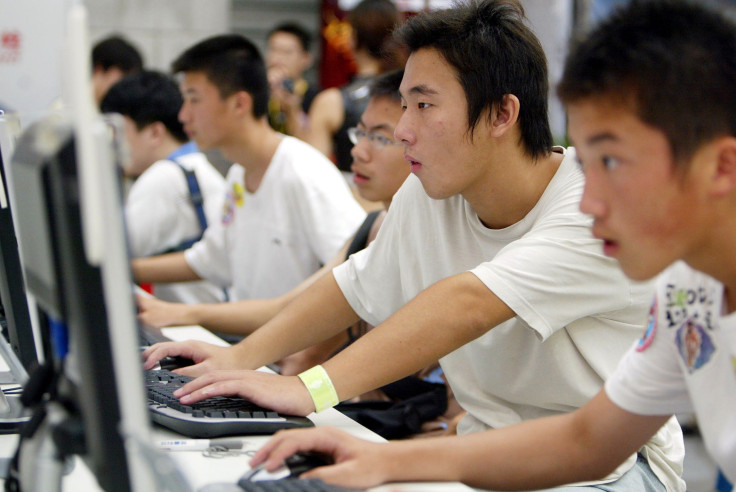China's Gamers: A New Superpower Dominates An International Tournament

Thousands of cheering fans filled the stands of Seattle’s Key Arena in a scene reminiscent of the crowds that the now-defunct Seattle Supersonics used to draw during their heyday in the 1990s. This weekend, it wasn’t Gary Payton and Shawn Kemp jerseys that adorned admiring crowds -- instead, a sea of Chinese flags waved patriotically as the stadium erupted in cheers.
An estimated 10,000 spectators found themselves in Seattle to watch Valve Corp.’s International ‘Dota 2’ Championships, a four-day computer game tournament that attracts players and fans from all over the world, most of them Chinese. Dota 2, the sequel game to Blizzard's hugely popular predecessor, Defense of the Ancients, has a remarkably large Chinese following.
“I saw this one girl literally about to explode after meeting someone from a Chinese team, she was so star-struck and could barely talk,” Tiffany Tse, a 23-year-old law student in Washington, D.C., said. Tse, a fan and player of the game, didn’t realize how immense the Chinese gamer public was until she flew to Seattle for the tournament over the weekend with a group of friends. “I knew that Chinese people love Dota but I didn’t really notice their presence when playing the actual game,” she said.
At the tournament, the presence of Chinese fans was impossible to ignore. Tse estimates that around 60 percent of the people she saw and interacted with were Chinese. But Chinese people weren’t just there to watch, they came to play -- and they were really good.
A group named “NewBee,” comprised of five Chinese players, took home the top prize, a whopping $5 million, to be split among the team. NewBee beat a fellow Chinese team, Vici Gaming, or “VG,” in the final matchup to earn the first place finish. Five of the eight other finalist teams also hailed from China.
China’s gaming community is in fact staggering by its sheer size. In a report presented at the 2014 Games Marketing Summit in San Francisco earlier this year, market research company EEDAR found that the population of Chinese gamers outnumbers the total number of American citizens. EEDAR estimates there are 517 million Chinese gamers, compared to the U.S., with 317 million people.
China’s government sports bureau, the General Administration of Sport, formally approved eSports as the country's 99th certified sport, going as far to pledge to “help organize eSports events in order to promote the country in the International eSports realm.” The certification was surprising considering China’s broad censorship rules, which until recently banned console gaming systems in the country, a ban that lasted 13 years.
Games like Dota 2 and League of Legends, a similarly popular multiplayer computer game which is partially owned by Chinese tech company Tencent, aren’t just popular because of bans on other gaming devices, but because they resonate with the Chinese mind-set.
“I think the game appeals to the Chinese gaming mind-set more,” David Qingwei Lew, a 22-year-old student who also attended the tournament. “Around the U.S., games like Modern Warfare, Grand Theft Auto, and other shooters are pretty popular for their focus on huge and spectacular settings and plot lines.” Conversely, games like Dota and League of Legends, Lew explains, are popular in China because they are “more strategic, somewhat akin to a game of Go or Chinese checkers.”
China’s increasingly impressive status in competitive gaming has also boosted the industry’s popularity back at home.
“Dota itself is incredibly popular in China, and the massive prize pool no doubt contributed to its rise in popularity,” Lew says. “The prize purses for such games (MOBAs, Multiplayer Online Battle Arenas) are getting just massive.”
This year the total prize pool for The International was $10.9 million, making it the largest eSports prize in history and also twice the prize of the 2013 U.S. Open Tennis Championships. The prize money is actually raised by fans, who buy the competition’s “Compendium,” a virtual booklet that allows fans to interact with fellow gamers according to how much they donate.
Lew says that this year was a particularly impressive showing by Chinese teams, calling it a “reincarnation” after a handful of teams didn’t compete last year. The support for Chinese teams was overwhelming.
During one elimination matchup which pitted an American team against a Chinese team, Lew says that “U-S-A! U-S-A!” chants were silenced when the Chinese team came out victorious: “Right as the American team was eliminated after the game, a huge number of Chinese flags literally appeared out of nowhere all over the stadium, being waved around by Chinese fans.”
© Copyright IBTimes 2024. All rights reserved.






















